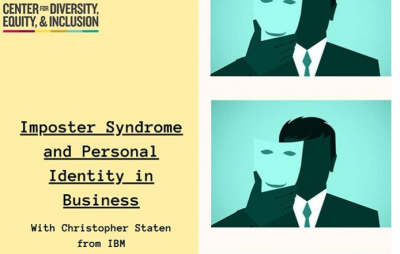Imposter syndrome can be defined as a slew of emotions that force someone to feel inadequate or like a fraud, despite success in their career or education.

Overcoming this can be difficult for many, especially college students who may feel as if they do not belong. On Wednesday, Boston University’s Questrom Center for Diversity, Equity, and Inclusion sought to navigate this issue in a webinar entitled “Imposter Syndrome and Personal Identity in Business.”
The event hosted guest speaker Christopher Staten, a client partner at International Business Machines who was previously the Boston chair of IBM’s Diversity and Inclusion Business Resource Group.
Staten opened his speech by saying he himself often confronts imposter syndrome — he is the first in his family to go to graduate school, make a living wage and enter corporate America, all of which trigger these feelings of inadequacy.
“I think I’m the expert in this subject,” Staten said, “because I experience it every single day.”
After introductions, Staten split participants into breakout rooms to discuss imposter syndrome and any personal experiences people wanted to share on their own feelings of self-doubt relating to their accomplishments.
For Caryne Nicholas, a senior in the College of Arts and Sciences, her fears of failing as a college student prompted her to attend the event. She said in an interview the ability to speak with other attendees in the breakout sessions offered insight into the prevalence of this issue.
“It helped seeing how many people were at the event, because oftentimes, you think that you’re the only one struggling with this,” Nicholas said. “It was cool to hear people’s input about their own experiences.”
Another attendee was Amy Bocos, a junior in the Questrom School of Business. Bocos also said in an interview the breakout rooms helped her see she was not alone in suffering with imposter syndrome.
“When we all got into our breakout rooms and just started talking about moments in which we felt it,” Bocos said, “it made me realize that there’s a bunch of different ways that someone can feel this certain type of way.”
Later in the webinar, Staten introduced the issue of racial minorities experiencing more imposter syndrome due to diversity issues in the workplace. Currently, every other Fortune 500 board includes a Black woman, he said, meaning half do not.
“So how do you feel if you’re the Black woman that is on the board of McDonald’s or on the board of whatever, and you’re the only Black woman?” Staten said. “Would you feel more like an imposter or more like ‘I belong here?’”
Nicholas said as a minority herself, she relates to this struggle of dealing with imposter syndrome at a majority-white school. She said it was helpful to realize that other minorities at BU also face similar concerns.
“It’s really difficult to find people who have the same struggles,” Nicholas said. “So it’s really nice to see the people that you would usually think are doing well and having no problems were there.”
Nicholas said one way BU could help students who are facing these frustrations is setting up a system to pair them with mentors they could relate to.
After these main discussions, Staten moved from imposter syndrome to the topic of personal identity, which he referred to as “where it all starts.” He said a tactic people could use to start to cope with imposter syndrome is to separate one’s identity from their career.
Staten described an academic scenario in which a person who normally receives high grades in school ties their self worth to their good performance, thus relying on high grades to define their worth. This is the type of issue Staten wants people to avoid, as this mindset can lead to affiliating bad performance with low self-worth.
“When you tie your self-worth to a bad performance or you doing a bad job at your profession in that one time, or you’re just failing once,” Staten said, “you tie that to you as a bad person. I can attest to this.”
The best way for someone to overcome imposter syndrome, Staten said, is to be honest with themself on their personal work ethic.
“If you’re really putting in the work,” Staten said, “you’ll realize that some of those rewards are not just because you’re a woman, not because you’re Latinx, not because you’re Black, but because you actually put in the work.”














